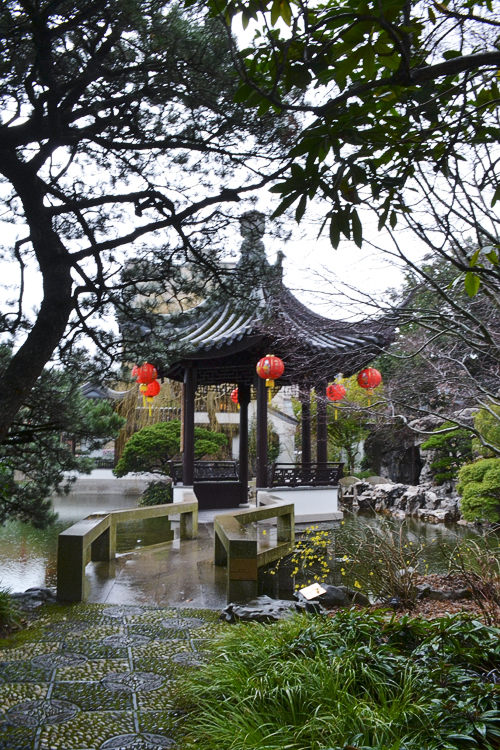
To the ancient Chinese, gardens symbolized the ultimate balance and harmony of man and nature.
“Though many of the gardens have been looked at with an evil eye, given all the political turmoil in China over the last few decades, many have become world artifacts,” said Ben Ngan, a Portland landscape architect who will be delivering a lecture on campus on Saturday, March 2.
The lecture, titled “From Asphalt to Chinese Literati Garden,” is part of the Institute for Asian Studies’ First Saturday: East Asian Program Series.
“We call it a literati because it’s in view with the intellect [of] Chinese scholars,” said Dennis Lee, founder and volunteer of the Portland-based Lan Su Chinese Garden. “These gardens are full of metaphors—the three friends of winter: pine tree, bamboo and plum flower.
“Both the pine and bamboo are evergreen,” Lee said. “The pine represents growing old graciously. Bamboo is hollow and flexible and able to move with the wind. And the plum tree’s first flower in spring represents perseverance. The combination of these three plants was intended to remind Chinese officials to be flexible and to persevere and to gain wisdom through their years of service.”
The Portland Lan Su Chinese Garden is modeled after gardens in Portland’s sister city of Suzhou. Located in the southeast region of the Jiangsu Province, Suzhou is called the “Venice of the East.”
Like Venice, Suzhou is “known as a place of fine art,” said Katherine Morrow, the program administrator for the Institute for Asian Studies. “Suzhou is the culture center.”
When the Classical Chinese Garden Society wanted to build a garden, “the first place they went to was Suzhou,” Lee said.
Ngan, a longtime member of the society, actually traveled to Suzhou to look for a model and was heavily involved in the creation of the Portland garden, also known as the “Garden of the Awakening Orchids.”
Literati gardens, or scholar gardens, were gardens often situated in the center of a city.
“The [Lan Su] garden itself covers one city block in the oldest part of Portland,” Lee said. “These kinds of gardens started in China and were placed right in [the] middle of [an] urban area. They were always walled. Even the one here is a retreat from urban noise.”
The First Saturday talks grew out of a need for professional development and an institute of knowledge for the garden’s 100-plus volunteer docents.
“They started meeting in [the] teahouse in the garden, however, their numbers became too big,” Morrow said. “And they started to look for other places to hold these meetings, which is when they approached PSU.”
Morrow said the university was all too happy to give the group the space to meet.
“It helps grow our program,” she said. “We want to be known for global excellence.”
Lee agreed on the benefits of the partnership.
“We are very happy at PSU [to] broaden the offerings in Asian Studies,” he said. “We have professors come in, and we love having students come and join in.”
The monthly talks are especially beneficial for the garden’s volunteer docents, who are able to attend most Saturdays.
The First Saturday series helps the docents to “be able to impart their new knowledge to their tours,” Lee said. “What’s great is that the docents give individual tours—each is different. The garden speaks to them individually.”
The institute’s talks, which have previously covered Korea and other Asian countries and topics, are now being refocused on the original reason for the talks, the Classical Chinese Garden Society and the creation and sharing of knowledge among its volunteer base.
From Asphalt to Chinese Literati Garden
A lecture by Ben Ngan
Part of the Institute for Asian Studies’ First Saturday lecture series
Saturday, March 2, 9:30–11 a.m.
Urban Building, room 250
Free and open to the public
Ngan said his lecture “will be full of stories about the garden’s inception, creation and construction, as I’ve been working with the Classical Chinese Garden Society since 1991, and I’ve served on the board until 2010.”
Ngan feels that those who get involved will be “richly rewarded,” and that university and community support is vital to the lecture’s continued success.
“The garden can only survive if people are interested,” Ngan said. “I want to continue to tell people about it and get people involved.”
Lee summed up why the Lan Su Garden continues to enchant visitors year after year:
“This is a garden of discovery,” Lee said.

